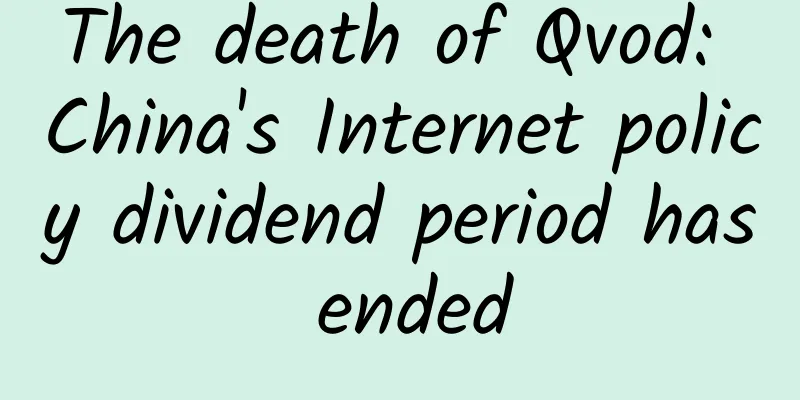The death of Qvod: China's Internet policy dividend period has ended

|
The topic about Kuaibo and Wang Xin is very sensitive, but this incident is not just about Kuaibo. It is a wake-up call for the entire Chinese Internet industry. Unfortunately, Kuaibo has become the "chicken". China's wildly growing Internet will be formally brought under "regulation". Regarding the Qvod incident, some people say it is a copyright piracy issue. This is true. There are many similar incidents around the world. In 2012, the famous American music sharing website "Million Upload" was also shut down, and several of its founders were sent to prison. Million Upload has more than 150 million registered users and 50 million page views per day, making it the 13th most visited website in the world. The website content includes videos, music and pictures, and users can upload or download them anonymously. They have earned more than $175 million from website subscriptions and advertising. In a sense, are Million Uploads and Qvod similar? Since Million Uploads can be shut down and its founders can be sent to jail, why can't Qvod be shut down? Looking at China, around April last year, the domestic high-definition film and television sharing website Silu.com was also closed down and a number of senior executives were arrested. Silu.com has more than 1.4 million registered paying members and over 30,000 users online simultaneously every day. With a monthly membership fee of 50 yuan, users can freely download all kinds of pirated Blu-ray high-definition blockbusters. Unlike Qvod, Silu.com and Baiwanshangdou.com profit directly from piracy, while Qvod, in a sense, fits the "safe harbor" principle. It does not directly profit from pirated film and television content. It has acquired nearly 200 million users in this way. It is hard to say whether it has reached a similar advertising-sharing agreement with those "small websites" that do piracy. Therefore, the investigation of Qvod has another deeper meaning besides piracy. China's Internet officially started in 1994, when the Zhongguancun Education and Research Demonstration Network Project entered the Internet and achieved TCP/IP connection with the Internet, thus opening up the full-function Internet service. Since then, China has been officially recognized by the international community as a country with Internet. The past 20 years have been a period of rapid growth for China's Internet industry. The Internet has produced batches of billionaires, including returnees like Robin Li and Zhang Chaoyang, as well as grassroots like Cai Wensheng. The Internet is an industry without class concepts. As long as you have the ability and ideas, the Internet can create miracles for you. However, there are too many problems in the process of the Internet's growth. Back then, video piracy was rampant, e-commerce was full of fakes, and games were full of box-opening gambling. Their theory is that when a company grows to a certain scale and attracts a certain number of users, the upper level may not make any moves, and it can also start to whitewash and transform at the appropriate time. Youku started to produce genuine movies and TV shows, Taobao started to crack down on counterfeits, and Giant gradually downplayed "gambling". But Qvod didn’t! Perhaps, Qvod had just attracted 200 million users and was thinking about washing its cover by making legitimate movies and TV shows, but the guillotine had already fallen. 200 million users seems to be a safety line. It would have been impossible to block it directly a few years ago. The most they could do was order it to make rectifications, but QVOD was blocked anyway. This tells all Internet companies that are thinking about entering or are doing something that it doesn't mean that you will be fine if you attract enough users or provide a certain amount of tax. It will still be blocked if it needs to be blocked. Qvod is a "model" that the above wants to set up, it is the "chicken". Qvod is big enough and influential enough. In 2011, the peak number of simultaneous online users exceeded 10 million, with more than 40 million daily active users and more than 120 million weekly active users. Qvod has completed its historical "mission" and sounded the alarm. This alarm is a heavy blow to the emerging mobile Internet entrepreneurship boom. Everyone should cherish it. Regulation is coming: the inevitable path for a mature industry The Internet will continue its myth of creating wealth, but the policy "bonus period" has ended. Just recently, the American magazine Wired published an article that "China's innovation has surpassed its reputation as a 'fast follower'. China is now breaking any perception of it as a follower." The magazine believes that China's innovation is ahead of the United States in at least five areas. 1. Large market. Although China currently has an astonishing 618 million Internet users, it is still less than half of its potential. In addition, China has 500 million mobile Internet users and 301 million online shoppers. 2. China has the world's largest and fastest-growing mobile communications companies. 3. China has more social information users than the U.S. population. 4. China is in a leading position in mobile e-commerce business. 5. Innovation in China may be difficult, but it is worth it. Because the evolution of the Chinese market is very different from that of the US market, its (electronic) ecosystem and user behavior are far more complex than those of the US. If you can create a successful product in China, you can succeed anywhere in the world. The Internet's bonus period still exists, but the bonus period of policy laissez-faire and barbaric growth will end. The most typical case is that it is rumored that the State Administration of Taxation is taking the lead in studying the policy plan for e-commerce tax collection and management. The State Administration of Taxation is in contact with some large domestic e-commerce companies to discuss specific taxation details. Once e-commerce companies are fully taxed, it is roughly estimated that tens of billions of yuan in taxes will be paid every year. China's Internet is already a mature industry. According to the report "China's Digital Transformation: The Impact of the Internet on Productivity and Growth" released by McKinsey Global Institute, in 2013, the Internet accounted for 4.4% of China's GDP, surpassing developed countries such as the United States, France and Germany. For such a mature industry, it is hard to believe that regulators will leave it alone. As a winner of Toutiao's Qingyun Plan and Baijiahao's Bai+ Plan, the 2019 Baidu Digital Author of the Year, the Baijiahao's Most Popular Author in the Technology Field, the 2019 Sogou Technology and Culture Author, and the 2021 Baijiahao Quarterly Influential Creator, he has won many awards, including the 2013 Sohu Best Industry Media Person, the 2015 China New Media Entrepreneurship Competition Beijing Third Place, the 2015 Guangmang Experience Award, the 2015 China New Media Entrepreneurship Competition Finals Third Place, and the 2018 Baidu Dynamic Annual Powerful Celebrity. |
<<: Wearable health devices: The future looks bright
>>: The next trend of smart hardware has not yet really appeared
Recommend
Asking for water from the sea is no longer a dream? my country can desalinate more than 1.6 million tons of seawater every day!
Author: Duan Yuechu Desalination technology is an...
Forgotten interests, where is the operational value of mini programs?
In the open class on December 28, Zhang Xiaolong ...
After symptoms appear, the mortality rate is about 100%! Be careful of 5 common situations
After reading the above popular science, you may ...
There are two major pitfalls in copywriting that 91% of marketers cannot avoid. Are you one of them?
Marketing can be frustrating sometimes. You have ...
Baidu vocational education and training industry advertising promotion case
This article shares with you Baidu’s advertising ...
How does WeChat Mini Program obtain data?
Q: How does WeChat Mini Program obtain data? A: G...
How much does it cost to develop a chemical industry mini program in Linxia?
How much does it cost to be an agent of Linxia Ch...
Analysis of oCPC delivery plans and strategies in the medical beauty industry!
Today let’s take a look at an oCPC case in the me...
What should you pay attention to if you want to buy a "sufficient" mobile phone in 2017?
A new top-level flagship smartphone naturally repr...
Who makes the water smell bad? Find the culprits of the water odor
Water is the source of life. According to the &qu...
Suning, Banma Network, and Huawei gathered at the Guangzhou Auto Show to promote GAC Aion
On November 20, the 18th Guangzhou International ...
Deconstructing the live streaming methods of e-commerce anchors
Can small-base accounts and white-label merchants...
Analysis of Douyin traffic gameplay in pure paid live broadcast room
The core competitiveness of the success of live s...
Attention! Heavy rain + thunderstorm + hail is coming!
Today (June 14), heavy rainfall continues in the ...









